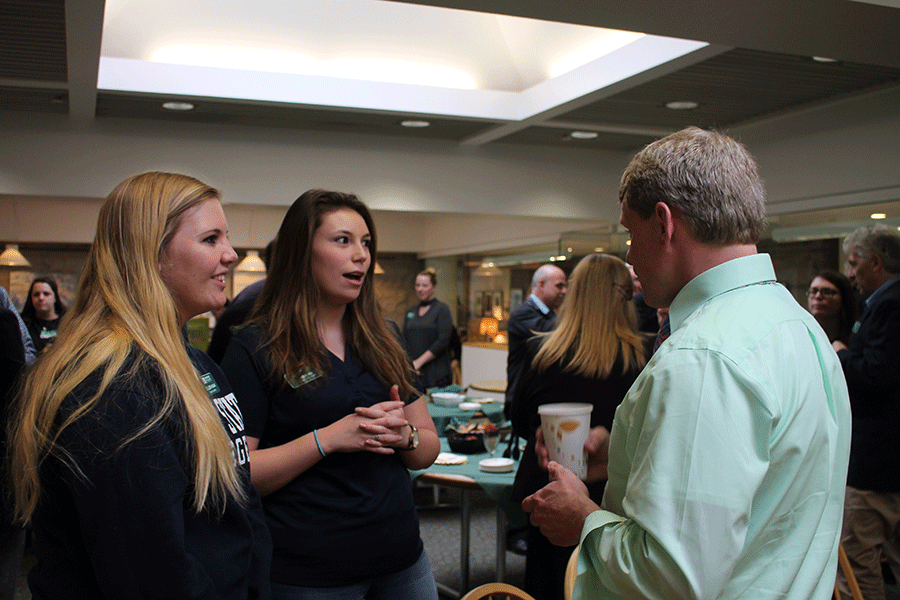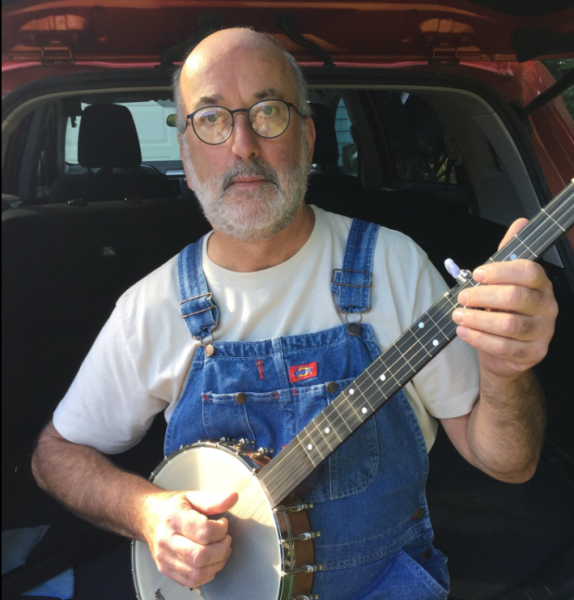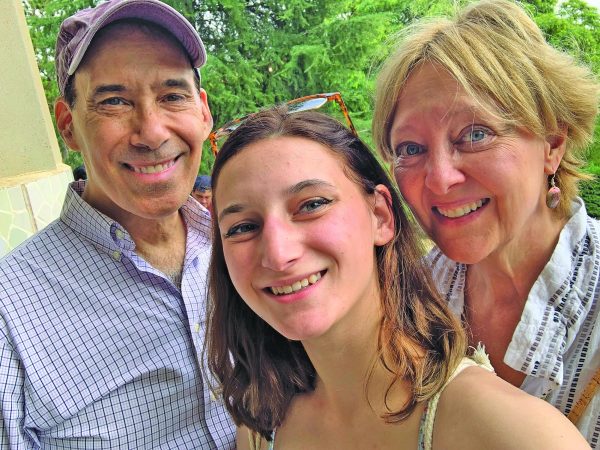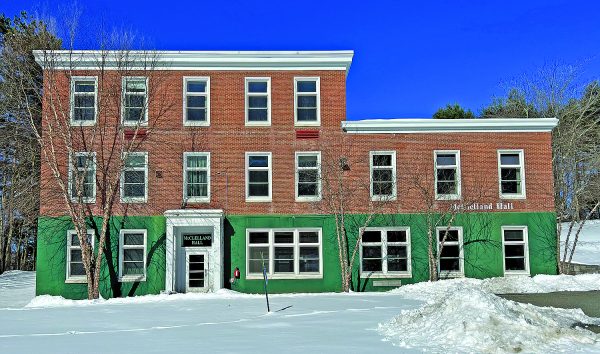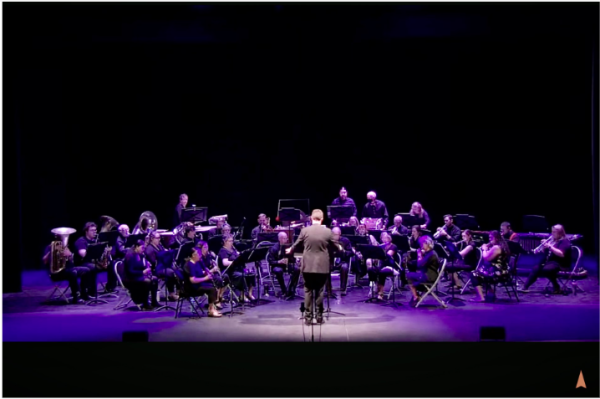Statehouse celebrates NVU
On Wednesday, April 19, Johnson and Lyndon State College faculty, staff and students filled the Vermont State House cafeteria, along with Vermont lawmakers and Vermont State College trustees. Together, they celebrated the upcoming unification and creation of Northern Vermont University.
A collaboration of Lyndon and Johnson concert band students warmed up their instruments as students mingled with senators and faculty members met with their counterparts from opposite campuses. Light refreshments were served, including cheese and crackers and apple cider.
After initial conversations had been had around the room, VSC Chancellor Jeb Spaulding took to the podium and introduced the band. Spaulding noted that this band merger is just the beginning of joint opportunities on both campuses.
“To illustrate the kind of power of unification, we’re going to have a musical selection from students collaborating from both Lyndon and Johnson,” said Spaulding. “When we unify, we’re going to be able to offer more to students. We’re going to make sure that the dollars we have are going to go to things that matter to students.”
After the band played, Spaulding continued his remarks and gave thanks to Governor Phil Scott and legislators for their support for NVU.
“Anybody that’s involved with the Vermont State Colleges beyond Johnson and Lyndon ought to know that this governor has offered a tremendous amount of support to the Vermont State Colleges system,” said Spaulding. “He proposed a $4 million base increase in our appropriations. He proposed a significant increase in the capital funds that we’ve been getting on an annual basis and that looks like it’s going to happen. The appropriation funds are still in play, so we don’t know about that. He also proposed a significant amount of funding for unification.”
Spaulding continued to compliment Scott on his understanding of the importance of the VSC system and how important the colleges are for Vermont residents.
“We enroll more Vermonters than the other colleges and universities put together as a group,” said Spaulding. “We’re like the public schools; we take a large range of students . . . There are an awful lot of successful people — whether they’re teachers in classrooms or in our hospitals or entrepreneurs or legislatures — that really wouldn’t have gone to college if it wasn’t for one of the state colleges, and I think Phil Scott deserves a lot of credit for recognizing how important we are.”
In the case of NVU, Spaulding assured the crowd that he and the board of trustees are committed to keeping the JSC and LSC campuses viable and vibrant through new opportunities for students both in and out of the classrooms.
“It’s about making sure that we’re there for the long-run . . . It’s about ensuring that we can compete in what’s a very, very difficult world out there,” said Spaulding.
Spaulding then introduced President Elaine Collins as the first President of NVU and complimented her fast-paced action in receiving the COPLAC recognition for JSC. Collins opened her remarks by reading a line from the NVU vision statement. The section she read focused on contributing to Vermont’s economy, environment and overall well-being.
“According to a report published by The Brookings Institute, the average bachelor degree holder contributes $278,000 more to local economies than the average high school graduate through direct spending over the course of a lifetime,” said Collins. “And keep in mind that 42 percent of alumni from four-year institutions remain in the area after graduating.”
Collins also stated that there are substantial health and environmental benefits and reduced criminal behavior in areas where four-year institutions are located.
“Think also of the cultural benefits: the creativity, the art exhibitions, the concerts, the cultural festivals, national and international exchange programs and cultural diversity,” said Collins.
Collins pressed her point of the importance of how quality colleges and universities can benefit the quality of regional lifestyle and wrapped up her speech by stating her commitment to providing higher education to Vermonters, along with enhancing the programs already offered at LSC and JSC.
“These communities are our home,” Collins said. “And it is up to us to be the strongest stewards we can be to contribute to the health, the welfare, the education and economics of our region.”
Dr. Nolan Atkins, who has served as academic dean and is the interim president at LSC, is the newly appointed provost of NVU. His remarks closed up the speaker portion of the celebration. He started his speech by telling the audience that the administration has to answer the question of, “What are the enhanced opportunities for students?” He then continued to share some of his answers for that question.
“Number one: new innovated degrees. An example that has potential is the new climate change science degree, which was created by Lyndon’s Atmospheric and Sciences Department,” said Atkins. “This multi-disciplinary degree includes meteorology, climate science, communications, biology, chemistry, environmental science, weather risk and global business. It has the potential to include environmental policy courses that are offered at Johnson to make it a truly collaborative degree program.”
Atkins noted that it is likely that this degree program may be the only one of its kind in the nation, giving NVU a unique, dual-campus major. Atkins then gave a nod to the business departments on both campuses, as they are offering joint upper-level courses connected by telepresence classrooms.
“By combining enrollment on both campuses, we can offer upper-level courses on a variety of topics that might not run from enrollment from just one campus. This teaching approach ensures that our students are receiving the breadth and depth of education that they deserve,” said Atkins.
Atkins admitted that there is still a lot of work to do, despite the promising cross-over courses.
“This summer, we will initiate a comprehensive review of our curriculum on both campuses to identify areas of collaboration, innovation and efficiency. In addition, we will engage in a process to develop a comprehensive strategic plan for NVU,” said Atkins.
Atkins then introduced the band again, calling their performance “a melding of education and approaches to music on both campuses.”
The celebration continued after the band’s performance and students, college employees and state representatives mingled.


